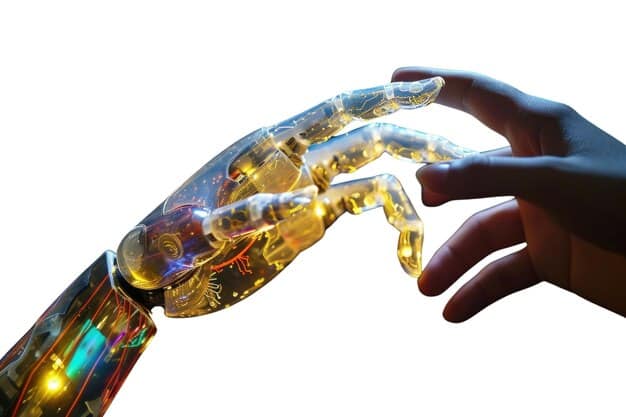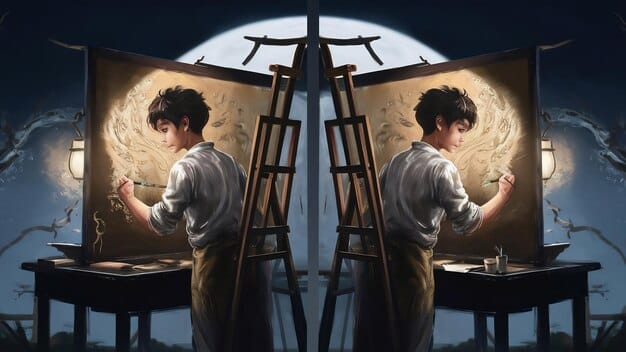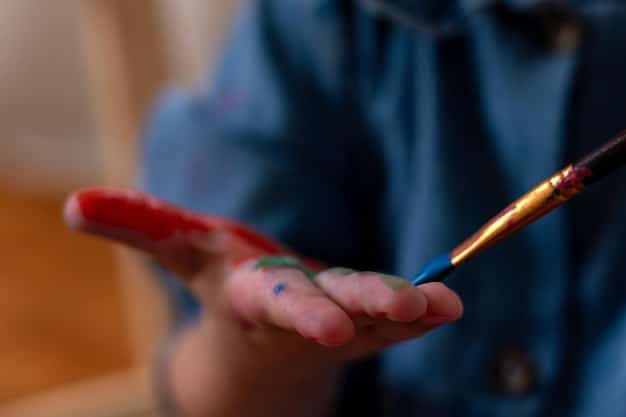The Impact of AI on Creativity: Will Machines Replace Human Artists and Writers?

The Impact of AI on Creativity: Will Machines Replace Human Artists and Writers? This explores the potential of AI in artistic fields, considering its impact on human artists and writers, and whether AI could eventually replace them.
The rise of artificial intelligence has sparked considerable debate across various sectors, and the creative industries are no exception. One of the most pressing questions is: The Impact of AI on Creativity: Will Machines Replace Human Artists and Writers? This article delves into this complex topic, exploring how AI is currently influencing artistic expression and examining the potential future role of AI in creative fields.
Understanding the Current Impact of AI on Creative Fields
Artificial intelligence is already making waves in creative fields, augmenting human capabilities and opening up new avenues for artistic expression. But what exactly is AI doing, and how is it changing the landscape?
AI Tools for Artists and Writers
AI-powered tools are being developed to assist artists and writers in various tasks, from generating ideas to refining their work.
- Text Generation: AI can generate text in various styles, from poetry to marketing copy, providing writers with inspiration and raw material.
- Image Generation: Tools like DALL-E 2 and Midjourney can create original images from text prompts, allowing artists to visualize concepts quickly.
- Music Composition: AI can assist in composing music, generating melodies, harmonies, and even entire arrangements.
- Video Editing: AI-powered video editing tools can automate repetitive tasks, such as cutting footage and adding transitions, freeing up editors to focus on the creative aspects of their work.
These tools are not necessarily intended to replace human artists and writers, but rather to enhance their abilities and streamline their workflows. The integration of artificial intelligence into creative workflows presents fascinating collaborative possibilities.

In conclusion, the current impact of AI on creative fields is largely one of augmentation, providing artists and writers with new tools and capabilities. However, the question remains: will this eventually lead to replacement?
The Potential for AI to Replace Human Artists and Writers
While AI currently serves as a tool for artists and writers, its rapid development raises concerns about its potential to replace human creators altogether. Is this a realistic possibility, or simply a fear-mongering scenario?
Arguments for AI Replacement
Several arguments suggest that AI could eventually replace human artists and writers.
- Increasing Sophistication: AI models are becoming increasingly sophisticated, capable of generating more complex and nuanced creative works.
- Unmatched Efficiency: AI can produce creative content much faster and at a lower cost than human creators.
- Data-Driven Creativity: AI can analyze vast amounts of data to identify patterns and trends, potentially leading to the creation of highly engaging and successful works.
- Algorithmic Perfection: AI can be programmed to eliminate errors and consistently produce high-quality output, potentially surpassing human capabilities.
These arguments highlight the potential advantages of AI in creative fields, raising the possibility that machines could eventually outperform human artists and writers in certain tasks.
However, it’s important to consider the limitations of AI and the unique qualities of human creativity as we think about The Impact of AI on Creativity: Will Machines Replace Human Artists and Writers?. The creative process is profoundly human, driven by our experiences, emotions, and unique perspectives.
The Role of Human Emotion and Experience in Creativity
Creativity is not simply about generating novel ideas or producing aesthetically pleasing works. It is deeply intertwined with human emotion, experience, and the ability to connect with others on an emotional level.
Emotional Depth and Authenticity
Human artists and writers draw upon their personal experiences, emotions, and perspectives to create works that resonate with audiences.
- Personal Connection: Human creators can infuse their work with their own unique voice and perspective, creating a personal connection with viewers and readers.
- Emotional Nuance: Human artists and writers can convey complex emotions and nuances that are difficult for AI to replicate.
- Authenticity: Human-created works often feel more authentic and genuine than AI-generated content, as they reflect the creator’s unique experiences and struggles.
- Empathy and Understanding: Human creators can tap into their understanding of human emotions and experiences to create works that are relatable and impactful.
While AI can analyze and mimic human emotions, it lacks the lived experience and genuine emotional depth that informs human creativity. This emotional authenticity is crucial for producing art that truly moves and inspires.

Therefore, it may be difficult, if not impossible, for AI to fully replicate the emotional depth and authenticity of human-created art. The Impact of AI on Creativity: Will Machines Replace Human Artists and Writers? is a complex question that demands we consider these factors.
The Collaborative Future: Humans and AI Working Together
Rather than viewing AI as a replacement for human artists and writers, it is more likely that the future of creativity will involve collaboration between humans and AI. By combining human ingenuity with AI capabilities it may be possible to arrive at a synergy greater than sum of the parts
Leveraging AI for Enhanced Creativity
AI can be used as a powerful tool to enhance human creativity, allowing artists and writers to explore new ideas and push the boundaries of their craft.
In this model, human artists and writers retain creative control, using AI to generate ideas, explore different styles, and refine their work. This allows them to focus on the aspects of creativity that require human intuition, emotion, and critical thinking.
By embracing this collaborative approach, it may be possible to unlock new creative possibilities and produce works that neither humans nor AI could create alone. As we continue to explore this intersection, it’s essential to address ethical concerns and ensure fair compensation for human creators.
It is important, when thinking about The Impact of AI on Creativity: Will Machines Replace Human Artists and Writers?, to consider how technology and creativity can work together
Ethical Considerations and the Future of Creative Work
The increasing role of AI in creative fields raises important ethical considerations that need to be addressed to ensure a fair and equitable future for artists and writers.
One of the most pressing concerns is copyright and intellectual property. Who owns the copyright to a work created by AI? Is it the programmer, the user, or the AI itself?
Fair Compensation and Recognition
Ensuring fair compensation and recognition for human creators is essential in a world where AI can generate creative content quickly and cheaply.
- Transparency: It is important to be transparent about the use of AI in creative works, disclosing when AI has been used to generate or assist in the creation of content.
- Fair Compensation: Artists and writers should be fairly compensated for their contributions, even when AI has been used to enhance their work.
- Protecting Human Creativity: Policies and regulations should be put in place to protect human creativity and prevent the exploitation of artists and writers.
These considerations are crucial for ensuring that human artists and writers are not marginalized or replaced by AI, but rather empowered to use AI as a tool to enhance their creativity and thrive in the digital age. Ultimately, the goal should be to create a creative ecosystem that values both human and artificial contributions, fostering innovation and artistic expression for all.
Ultimately we are faced with a discussion on The Impact of AI on Creativity: Will Machines Replace Human Artists and Writers?, which includes economics, property and ethics.
| Key Point | Brief Description |
|---|---|
| 🤖 AI as a Tool | AI currently augments, not replaces, human creativity. |
| 🎨 Human Emotion | Human emotion provides depth and authenticity absent in AI. |
| 🤝 Collaboration | Future likely involves humans and AI working together. |
| ⚖️ Ethical Concerns | Copyright, compensation, and transparency are crucial. |
Frequently Asked Questions
AI is currently used as a tool to assist artists and writers, helping with tasks like text generation, image creation, and music composition, but it’s not replacing them outright.
While AI can mimic certain aspects of creativity, it lacks the emotional depth, personal experiences, and human intuition that are essential for truly original and impactful art.
Ethical concerns include copyright ownership, fair compensation for human creators, and transparency in the use of AI-generated content, all impacting The Impact of AI on Creativity: Will Machines Replace Human Artists and Writers?
Humans and AI can collaborate by leveraging AI’s capabilities for tasks like idea generation and content refinement, while humans retain creative control and provide emotional and artistic insight.
While AI may automate some tasks, it’s unlikely to completely replace human artists and writers due to the importance of human emotion, experience, and critical thinking in creative endeavors. The Impact of AI on Creativity: Will Machines Replace Human Artists and Writers? is debatable.
Conclusion
In conclusion, The Impact of AI on Creativity: Will Machines Replace Human Artists and Writers? is a nuanced question that demands careful consideration. While AI offers incredible new tools and possibilities for creative expression, it lacks the emotional depth and lived experience that form the core of human artistry.